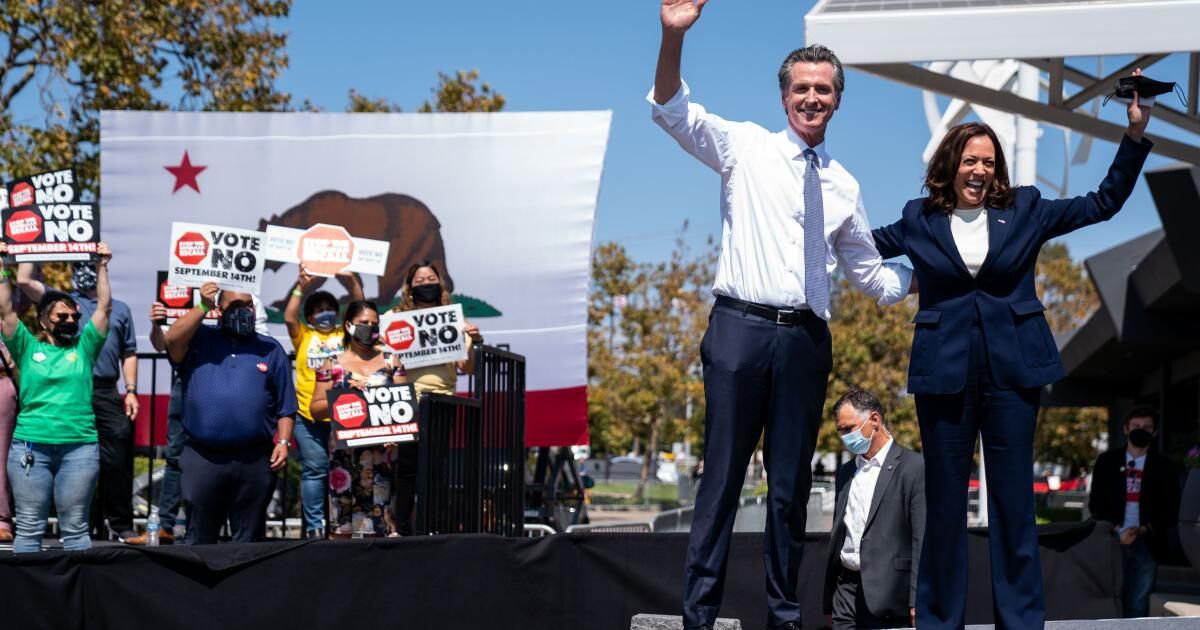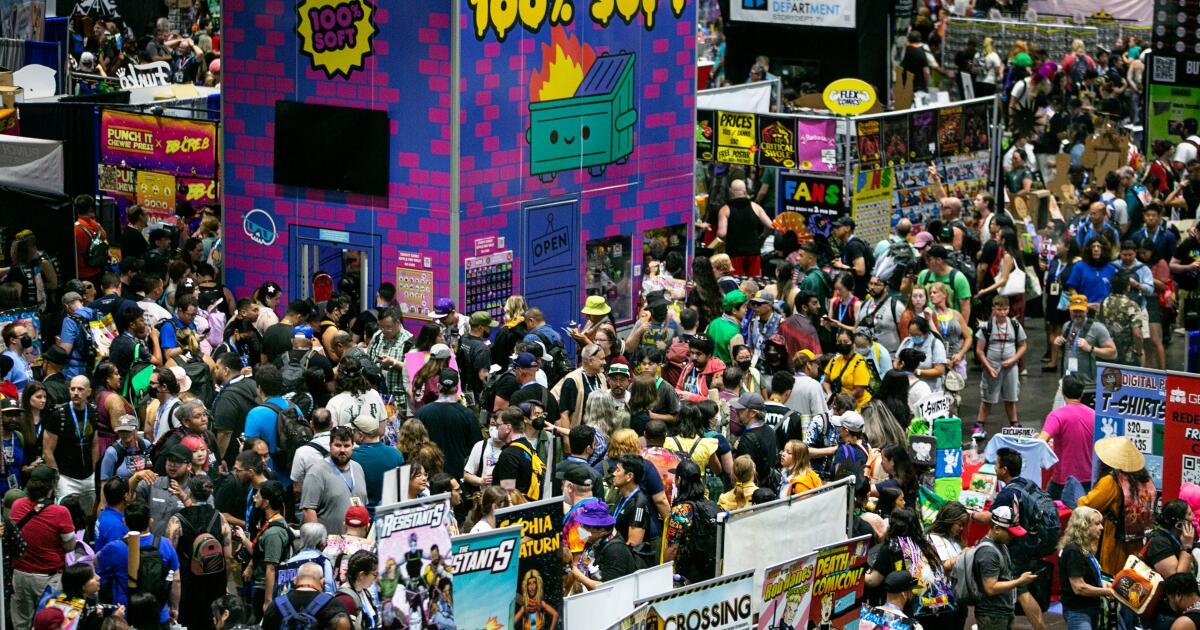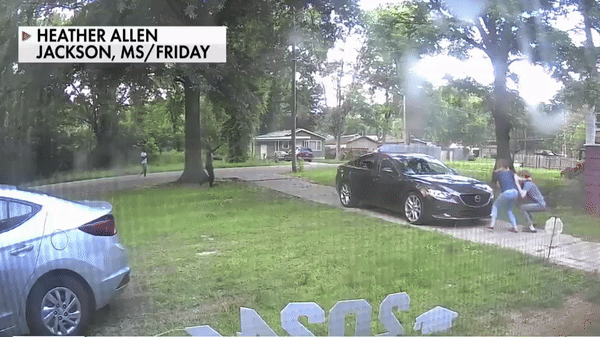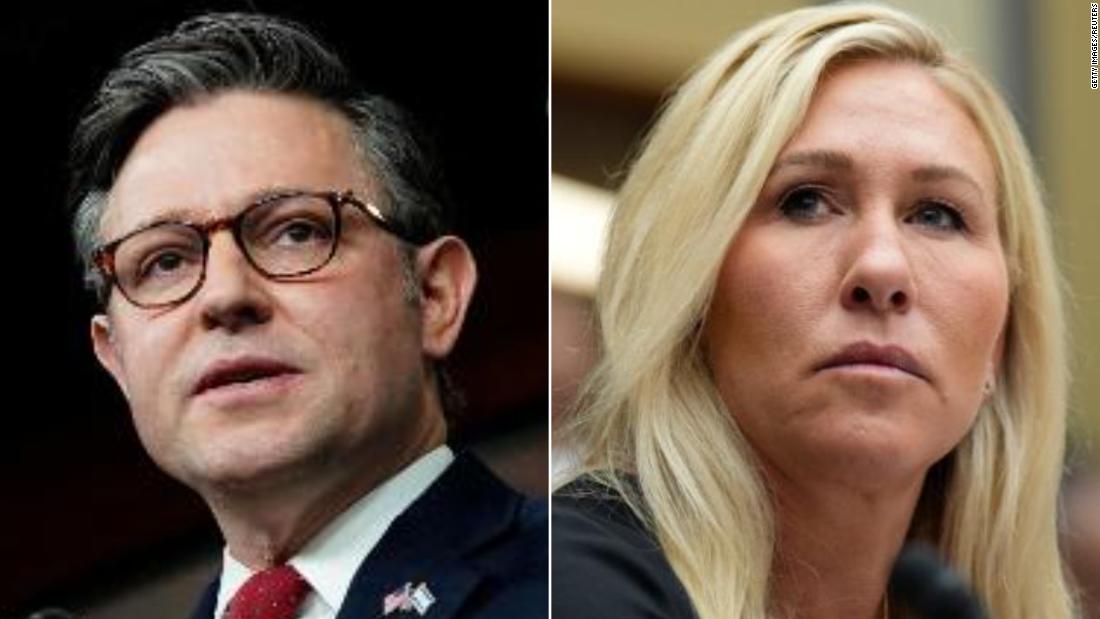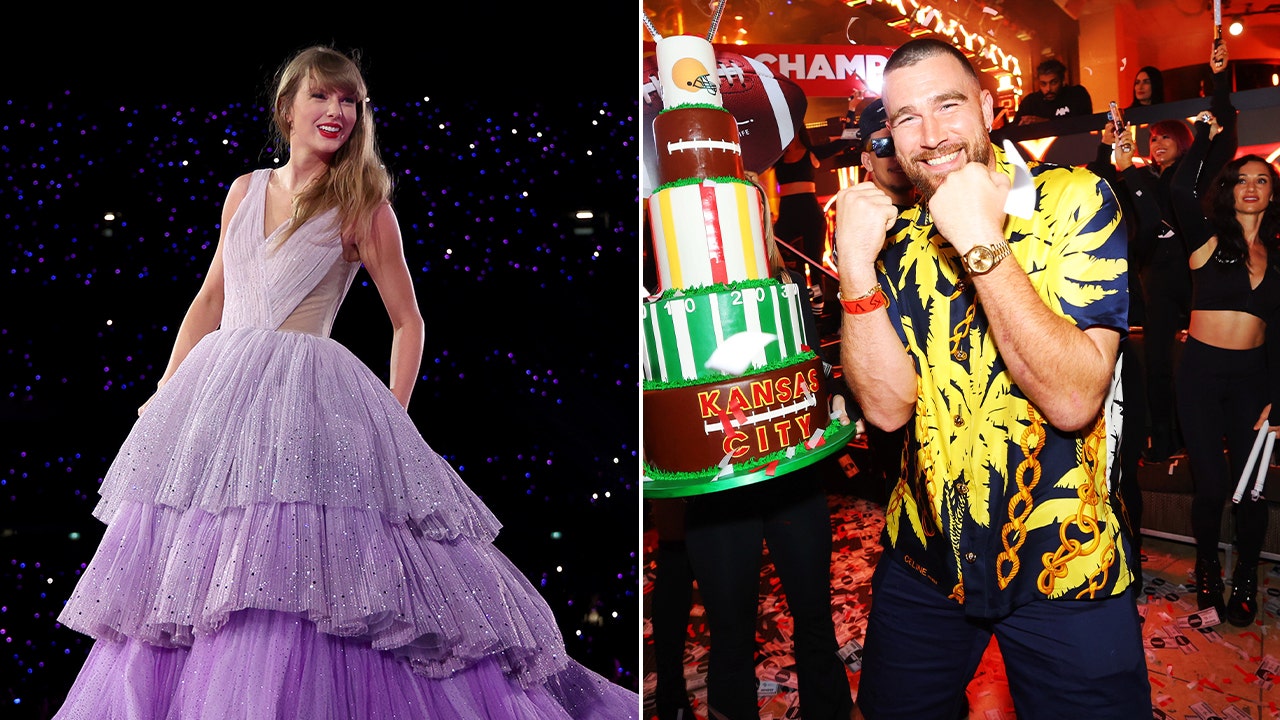As rising stars of the California Democratic Party, Kamala Harris and Gavin Newsom sidestepped a potentially tough campaign battle in 2015 when she decided to run for the U.S. Senate and he announced his candidacy for governor.
This week, Newsom said he would avoid a potential even bigger head-to-head fight with Harris for the White House.
The California governor repeated that he will not run against Harris, standing by a comment he made last year that has new relevance after President Biden’s performance in the June presidential debate left many in the party calling for him to drop out of the race.
While Biden has vowed to press ahead with his re-election campaign, a move Newsom has strongly supported, Harris and the California governor have been widely mentioned as potential replacements for the Democratic presidential nomination. As vice president, Harris appears to be the front-runner and has the most legitimate chance of winning it, given that she is already on the shortlist for the 2024 election.
“Absolutely,” Newsom said when asked if he would continue to decline to run against Harris. “Yes.”
If upheld, his decision could save the party and its donors from having to choose between California's two most prominent politicians.
If Biden declines to challenge Harris, Newsom will have a longer path to the White House, which would preclude him from seeking the presidency until 2028 at the earliest. Harris, on the other hand, could find herself leading a last-minute rescue mission to salvage the Democratic Party’s campaign against former President Trump and realize her own presidential dreams.
For Newsom, avoiding confrontation is also a tacit acknowledgement of political reality: Trying to bypass the vice president — and potentially the first Black female president — would not bode well for the governor or most other Democrats.
His own chances of becoming the Democratic nominee could also be better in four years.
“This is not the time to make that power move, and I think Gavin Newsom understands that,” said Aimee Allison, founder and president of She the People.
Allison's group, which pushes for more women of color in elected office, advocated for Biden to choose Harris as his running mate in 2020 and rallied voters to support the cause.
Back then, many expected Biden to be a one-term president. By choosing Harris, he helped revive her political career after the failure of her own presidential campaign and raised the possibility that Biden could pass the baton to her before this year's primaries.
While Allison praised Newsom for his recent ad campaigns in conservative states denouncing his efforts to rescind reproductive rights, and for his political attacks on Florida Gov. Ron DeSantis, she said he has more work to do to present himself to the country.
“My sense was, and remains, that a generational transition right now with Kamala Harris at the helm is logical, and it’s also the closest thing Democrats have to a winning strategy at this point in the cycle,” Allison said.
Polls show Harris leading other potential Democratic candidates. She also appears to be performing about the same as Biden against Trump in the polls. But the longer Biden stays in office, the shorter the window of maneuver will be and the harder it will be for anyone else to launch a campaign if he steps down.
At a news conference Thursday, Biden praised Harris and again vowed to stay in the race.
“She is qualified to be president, that’s why I chose her,” he said of her 2020 selection as his running mate.
Newsom first said he wouldn’t run against Harris in a September interview with Chuck Todd on NBC’s “Meet the Press.” Biden had already launched his reelection campaign, but rumors persisted about whether the president should run again. The governor made clear he supported Biden and said Harris was naturally prepared to run if the president dropped out of the race.
During a swing through key states earlier this week to campaign for the Democratic nomination, Newsom said that as someone who has known Harris since before either of them entered politics, he believes Harris could beat Trump.
“I have no doubt about that,” he told reporters in New Hampshire. “If it happens, I don't think it will happen.”
Harris, who was born in Oakland, worked for 13 years as a prosecutor in Alameda County and San Francisco before running for San Francisco district attorney in 2003 and winning. She then served as California's attorney general from 2011 to 2017, and then joined the U.S. Senate.
Like his contemporary, Newsom grew up in San Francisco, where he started as a parking commissioner in 1996. A businessman with a chain of wineries, hotels and retail stores, he soon served on the San Francisco Board of Supervisors and was elected mayor in 2003. He served two terms as California's lieutenant governor and won the gubernatorial race in 2018.
The governor largely avoided directly answering questions about whether he would run to replace Biden following the late June debate in Atlanta, which he attended as the president’s surrogate. Biden’s performance, in which he struggled to answer questions and was at times at a loss for words, left Newsom facing a barrage of questions about his own ambitions as panic gripped Democrats.
But Newsom remained a campaign foot soldier and reiterated that he supported Biden as the party’s nominee. In an attempt to shore up support for the president, he dismissed concerns about Biden’s mental capacity and attested to the president’s fitness based on his personal interactions.
“I think I've had 100 media outlets ask me the same question, and I think I've responded broadly with my support for the president, and the support I saw on the ground was demonstrable,” Newsom said at a news conference at McClellan Airport in Sacramento on Wednesday upon his return from the campaign trip.
Newsom also reaffirmed his stance that he would not run against Harris in a presidential campaign. Days earlier, another top Democrat, Michigan Gov. Gretchen Whitmer, had also said she would not consider running if Biden were to step down.
Giving up on a desperate bid to become the party's nominee at the August convention is politically smart for Newsom, said Thad Kousser, a political science professor at the University of California, San Diego.
Newsom can score points for wholeheartedly supporting the Democratic ticket, regardless of whether Biden or Harris is in the lead. He can continue to use the opportunity to act as a proxy for the ticket, attending debates and traveling the country in a way that allows him to meet more voters across the country without stepping on Biden or Harris’s heels. Then he can wait for the dust to settle to determine his future presidential prospects.
“He took a reality and turned it into a virtue,” Kousser said. “He certainly gave up a short-term chance of assuming this role and leading Democrats to victory in 2024. He set himself up pretty well for 2028 and beyond.”
If Harris or Biden win in November, Harris would again be a front-runner in the 2028 presidential election, leaving Newsom in a difficult position if he wants to run then. A Democratic loss in November could send Harris’ presidential hopes plummeting with the campaign and open the door for Newsom, or someone else, to clinch the nomination in four years.
Such a loss would mean Newsom’s final two years in office would be spent in a high-profile battle with an antagonistic Trump White House, potentially setting the stage for a 2028 campaign in which his primary competition in California is already neutralized.
“If Joe Biden or another Democrat loses, I think Gavin Newsom is the presumptive leader of the opposition to Donald Trump,” Kousser said, “because he has been the most vocal critic of the direction Donald Trump wants to take America.”
Times Staff writer Seema Mehta contributed to this report.

